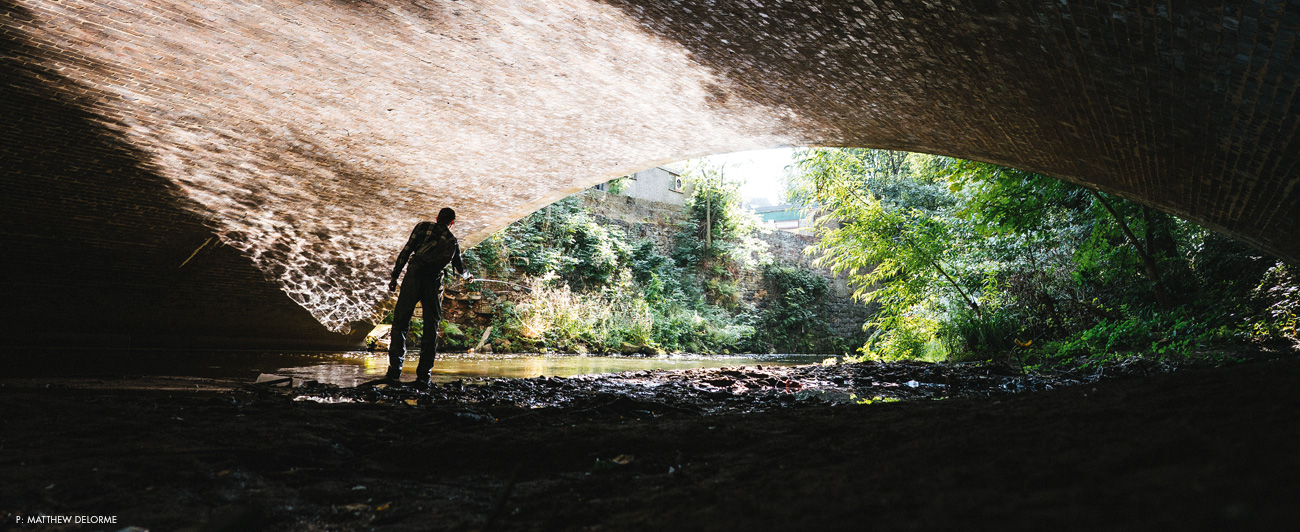Locale
Everyone’s Water
Urban and Wild in Northern England
I arrived in mid-September. Sheffield’s Sheaf and Don rivers—one is the city’s namesake, the other is named for a Celtic goddess—meandered along walls that were likely centuries old, past industrial warehouses and under arched stone bridges. We wandered narrow, winding streets jam-packed with row houses looking for access points that would lead us to the rivers’ browns and grayling. It was an uncompromising reminder of those early days on my home river, scrambling over the old stonework of the factory foundations while I searched for browns with my first fly rod.
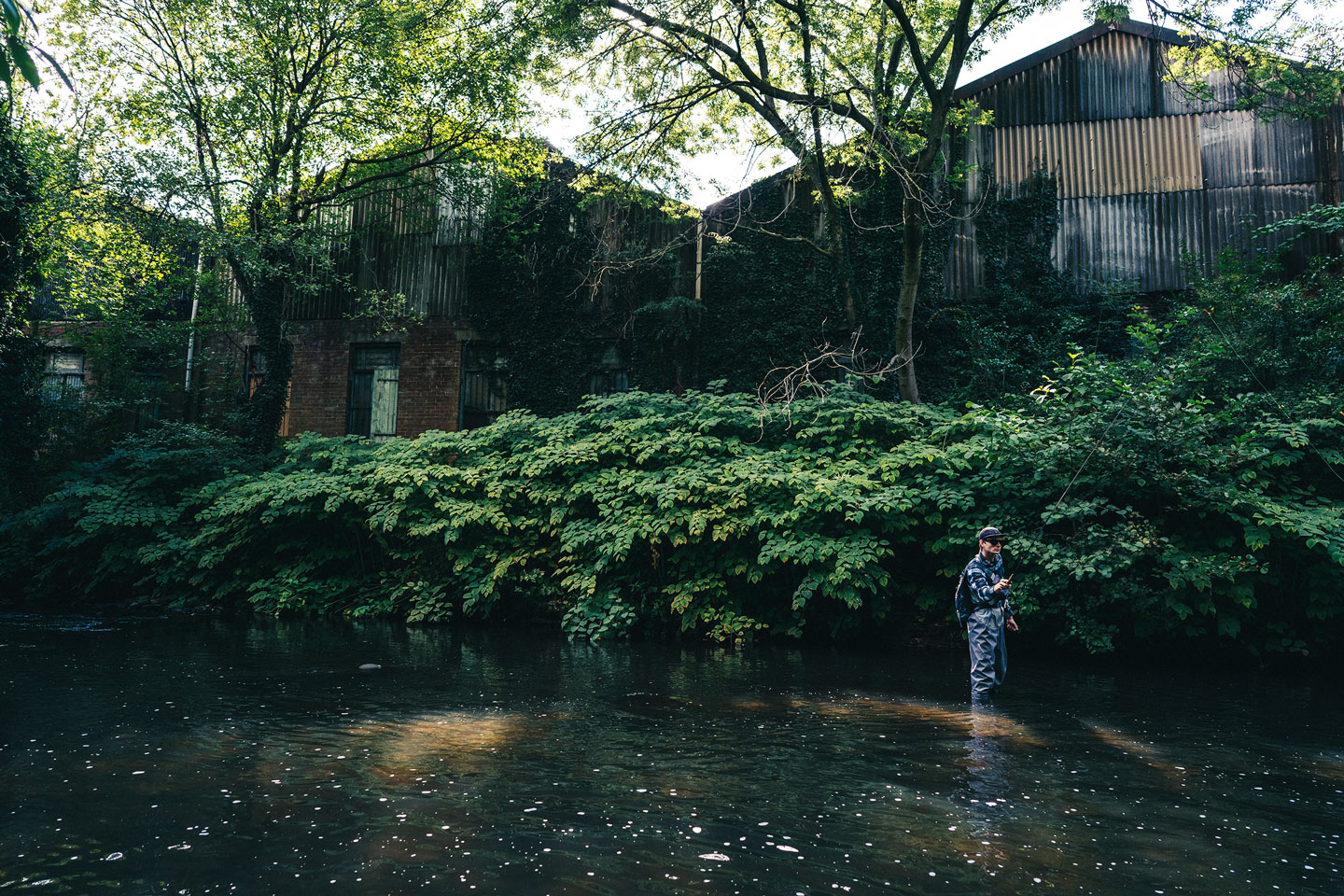
above While forklifts beeped and heavy machinery whined and whistled, we melted into the urban environment, navigating our way through dense vegetation and refuse in search of fish.Photo: Matthew DeLorme
Still, the rivers weren’t as Shire-like as I’d hoped. Sheffield is an industrial city in north-central England, and its streams suffer from the trash and detritus often found in such locales: beer bottles and free weights, car tires and soccer balls, garden tools and bits of refrigerator. At one point, after fishing through a riffle and hanging up on the bottom, I reached into the water to free the snag, calling into question the efficacy of my most recent tetanus shot when I found a bit of rusty old pipe at the end of the leader.
It wasn’t only urban detritus; just like the densely packed row houses along the city’s streets, the rivers flowed through close quarters, the city crowding in on either side. One morning, crouching in the shade of dense shrubbery beside a shallow riffle, I misjudged the room for my backcast, just as I was finding my rhythm. I ended up spending more time retrieving my line from branches than I’d like to admit.
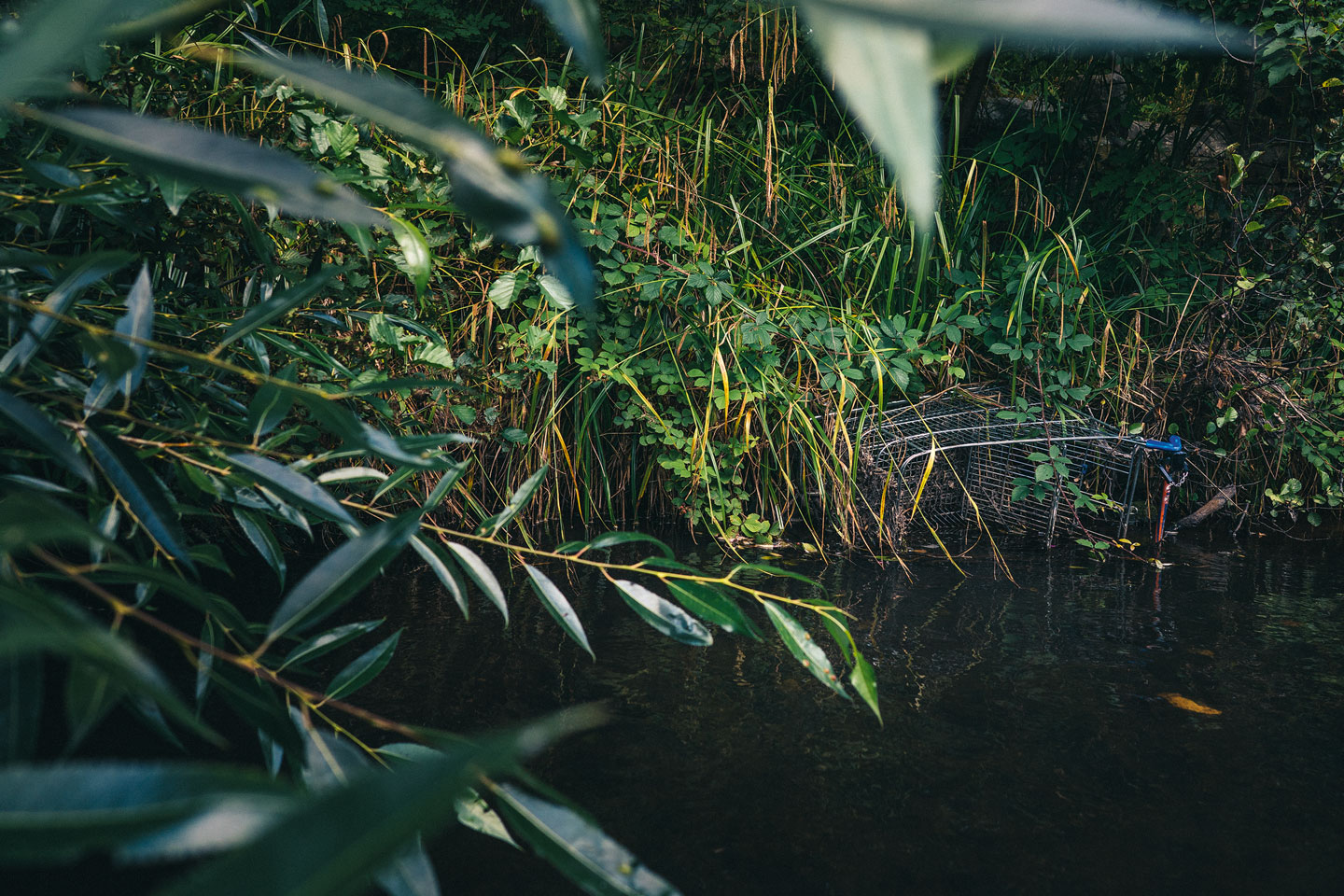
above At first I was staggered by the amount of refuse in the water. The sheer variety was shocking, but soon it became part of the landscape just as common as the reeds lining the banks.Photo: Matthew DeLorme
While I flailed about, getting my head around myriad snags and the general refuse, Duncan caught one little gem of a fish after another out of water no deeper than six inches in places. As the first day progressed and I became acquainted with my surroundings, I felt more like a fisherman.
We wandered the backstreets of Sheffield in our waders for a few days, like strange, half-suited astronauts, lost and looking for their rocket. At times, we were clearly in someone’s backyard. Curious faces peered at us from bridges or from the yards of the many small fabrication shops that dotted the riverbank. No one seemed particularly bothered by our presence, but I often read the expressions on their faces as saying, “Why the hell would you fish in that?”
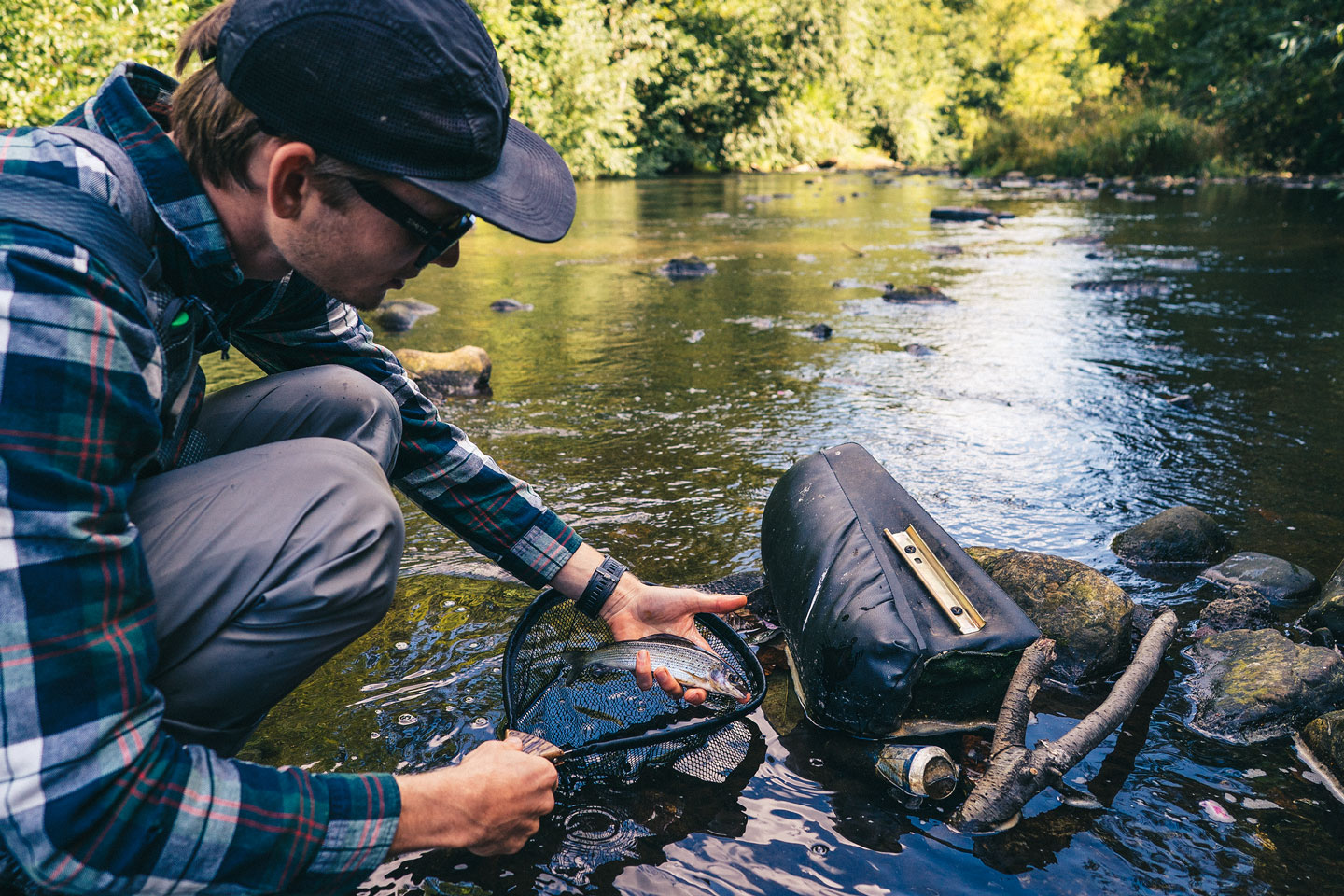
above One of the most striking things about fishing the Sheaf and Don was the sheer number of fish in the rivers, despite the pollution. Among the refuse, little jewels of fish thrived.Photo: Matthew DeLorme
Duncan’s suburban home waters were unique in their way, and he had them dialed. He’s a devotee of European flyfishing techniques, replete with what is a most admirable English trait: making due with what he has. He describes the circumstances in which he found himself fishing these city rivers as just that, making due.
Duncan had started flyfishing a few years previous on a work trip to New Zealand. Upon his return to England, he found many of the local rivers were subject to club fees of as much as 1,000 pounds—or more than $1,300—and waiting times for prime beats in excess of 10 years. Not one to give up easily, he found water to fish away from the private beats of the fellows with thicker wallets—the rivers in the city had dubious owners’ rights and were fair game. He honed his skills on these rivers, and quickly became efficient in reading currents, sneaking up on holes and casting in tight quarters, while avoiding partially submerged shopping carts and the lush green vegetation that overhangs the banks.
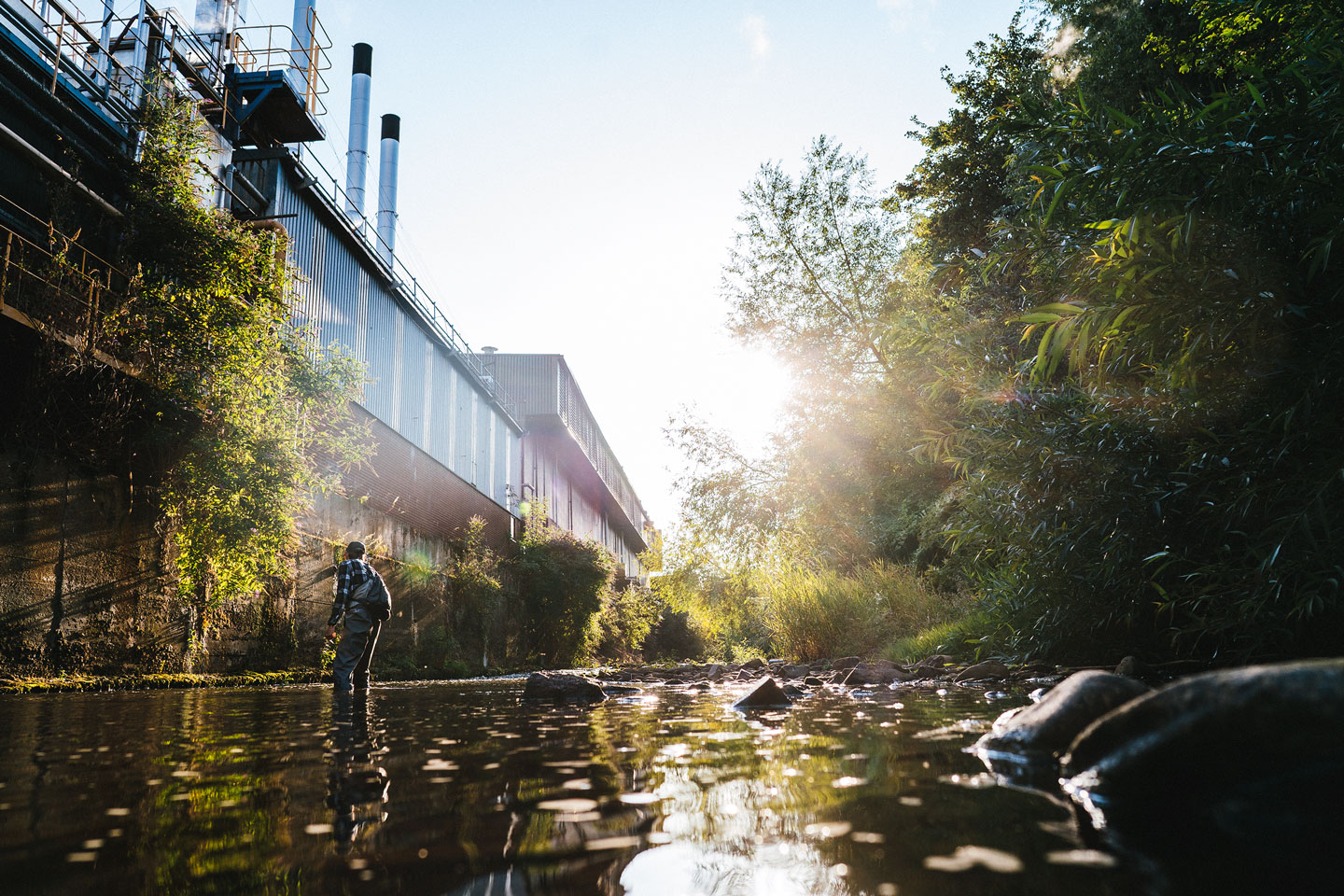
above Late-summer-evening sun along the wall of the Cadbury factory in Sheffield. Smokestacks rained down a fine licorice-scented mist, giving the warm air a sickly sweet quality. It was one of the most surreal fishing experiences I’ve had and one I will never forget.Photo: Matthew DeLorme
We covered several stretches of the Sheaf and Don, their waters a deep, dark, 3-a.m.-gas-station-burnt-coffee brown that reminded me of my own childhood river. Occasionally the water would lighten, and we would catch a glimpse of a ghostly fish moving off station, only to quickly blend back into the streambed.
We fished through successive cityscapes, from residential neighborhoods to small industrial complexes, and even quieter areas that brought a sporadic and fleeting sense of wild space. Evidence of the city was never far away, be it refuse or buildings, the rumble of cars on overpasses above us or drumming down narrow cobbled streets, or the omnipresent hum of the everyday hustle and bustle of Brits going about their business.
On my last day in Sheffield, we snuck into a little run where the river ran along a wall of the Cadbury candy factory. Kids passed overhead on their BMX bikes, joking in thick northern accents. We casted to the hum of a nearby power station, the jarring interruption of a fire alarm, the beep beep of a forklift backing up in a warehouse beyond the riverbank. The air was heavy with the scent of licorice; smokestacks released a fine mist into the warm evening air as the day drew to a close while we searched for our own sweet spots in Sheffield’s watery back alleys.
The air was heavy with the scent of licorice; smokestacks released a fine mist into the warm evening air as the day drew to a close while we searched for our own sweet spots in Sheffield’s watery back alleys.
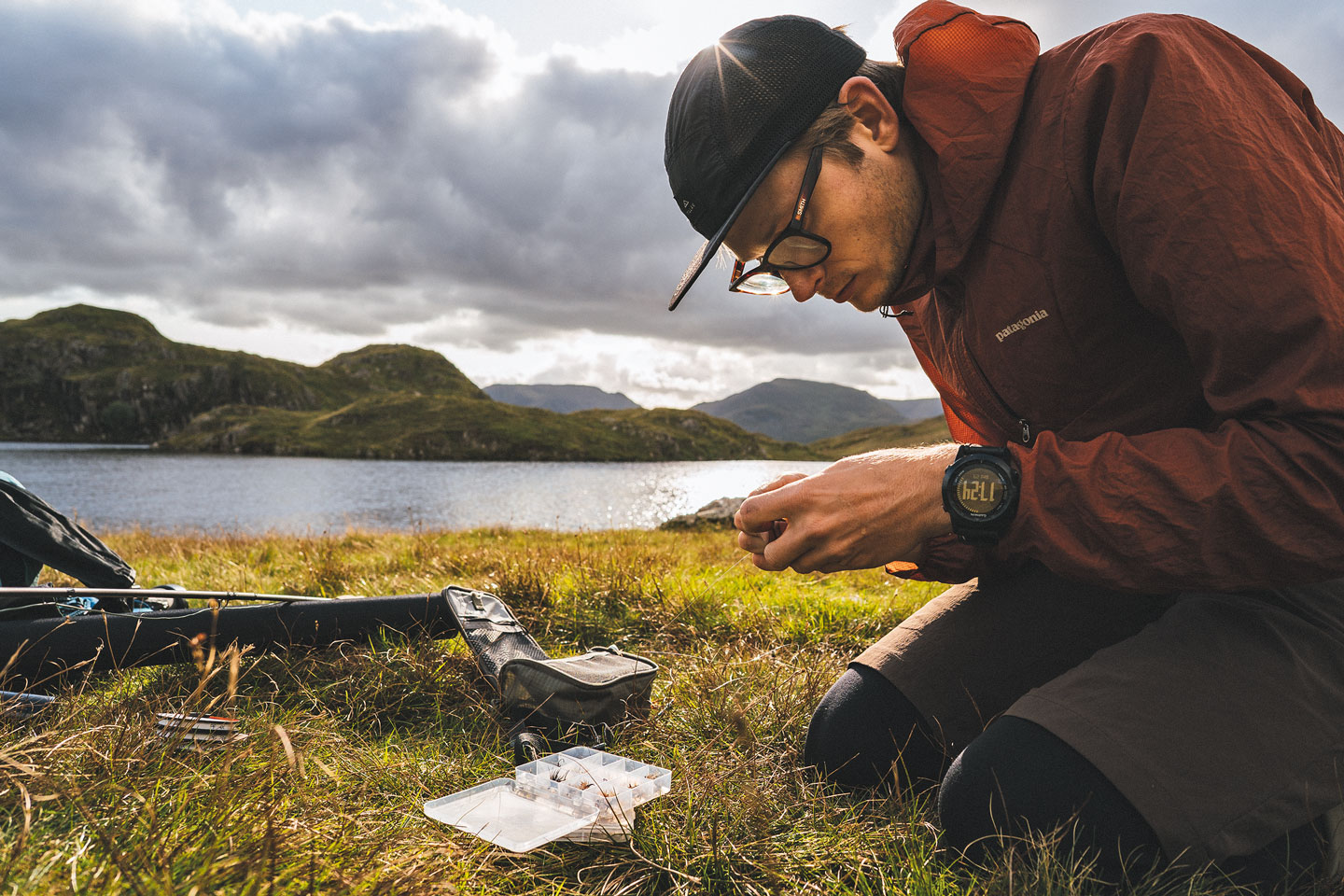
above After hiking through a jaw-dropping landscape, Duncan and I dropped everything and rigged up. We fished well past sundown and returned to camp in the dark with our gear still strewn about.Photo: Matthew DeLorme
After a few days of fishing within the confines of greater Sheffield, we traded the hum of city life for the peace and quiet of the northern highlands. Just a few hours out of town brought us to rolling countryside, worlds away from the brick-and-cobble byways of Sheffield. Stout, stone walls bisected lush, green hills dotted with grazing sheep. We headed into the Lake District, England’s northwestern-most national park, and the gentle, vibrant hills gave way to more substantial mountains. William Wordsworth, the 19th century romantic poet, moved to the Lake District around 1799 and settled into Dove cottage in Grasmere. He and other poets of the area later became known as the “Lake Poets.” These mountains and lakes helped shape Wordsworth’s poetry for years to come into what he described as the “organic connection of things.” The district’s high mountain lakes, or tarns, were a picture of perfect tranquility. No wonder the Lake Poets found such inspiration here.
Rain had been rare during the summer in northern England, with much of the region facing drought. The day was warm but not too hot, perfect for hiking. Wispy clouds moved over the landscape, throwing dramatic shadows across the mountainsides. Sheep dotted the fields with their heads down, slowly grazing on the rich green grass in the lower valleys, their bells ringing with muted tones. The views opened up as we passed a few farm gates along a dirt access road, and creeks ran down from every hill around us.
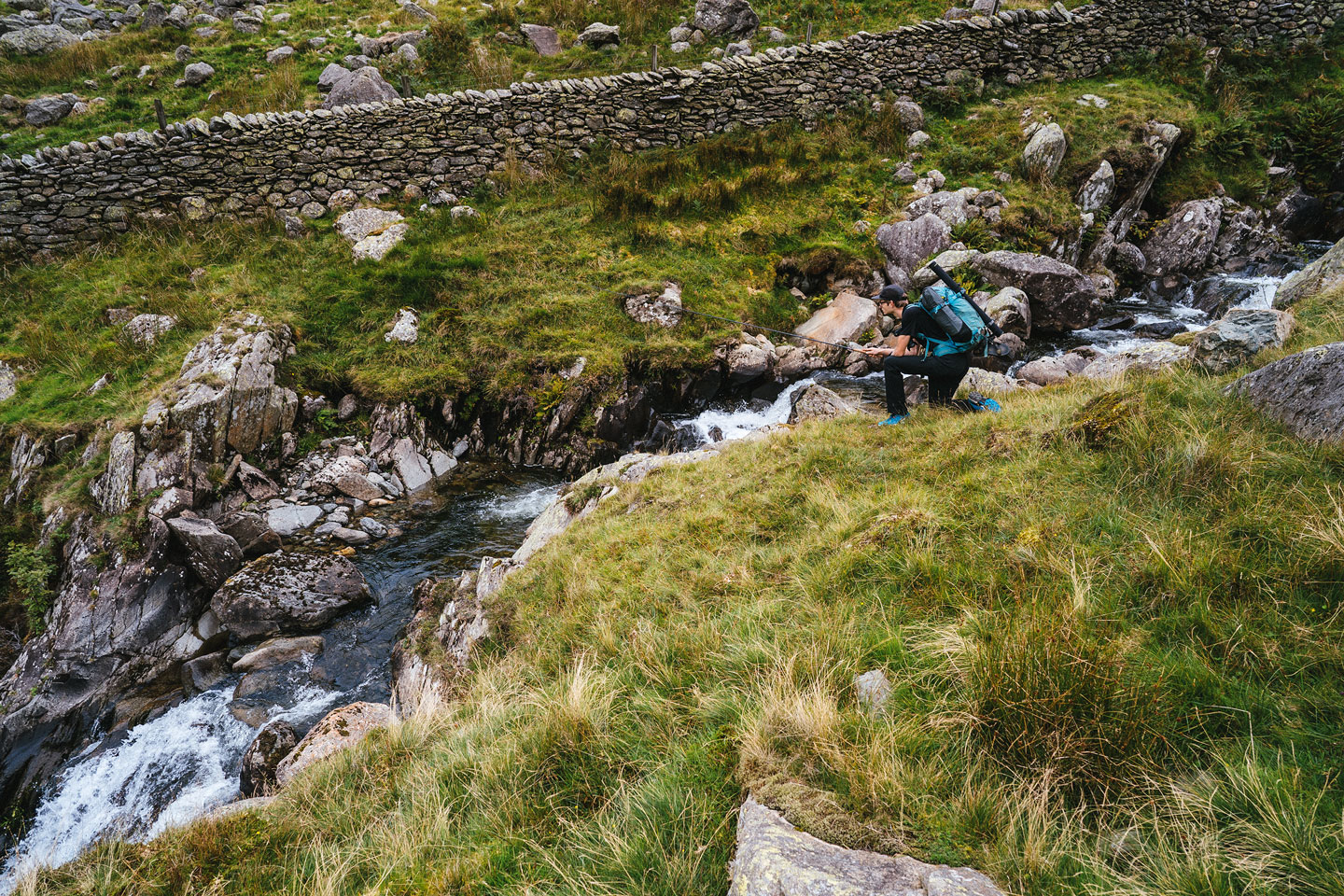
above Outlet creeks from alpine tarns rushed to the valley floor, cutting deep channels into the hillsides. The small plunge pools were home to voracious little browns.Photo: Matthew DeLorme
The prospect of trout in each plunge pool excited us. It was difficult not to stop and fish each piece of water on the ascent, but we knew if we did we would never make it to the tarn. Crossing a bridge over one of the creeks, we started the climb to higher elevations. Unlike Sheffield, where each bend in stream or roadway revealed more confirmation of human presence, each turn in the Lake District took us farther away. The higher we climbed, the more spectacular the views became; rugged granite peaks covered in heather turned a golden hue while the last light of summer ran in layers on the horizon. We crested a final rise to get the first view of our tarn, nestled in a small valley with the Lake District peaks looming in the distance. A perfect solitude. We found a small peninsula right off the main trail, dropped everything and rigged up.
Through the afternoon and evening we searched for browns along the nearest half of the lake, happy to have space to open up and cast. We all but struck out that evening as we fished well past sundown, searching for trout we knew were there. We layered up as the air cooled and the sun set. Duncan managed a couple of yellow perch, and that was enough to bolster our spirits for the day. Unfortunately, in our haste to get fishing, we realized we hadn’t set up camp, and it was well after dark. After some fumbling with the tent and bags of freeze-dried supper, the northern air grew colder with each star that started to shine in the sky, and we warmed ourselves over the camp stove.
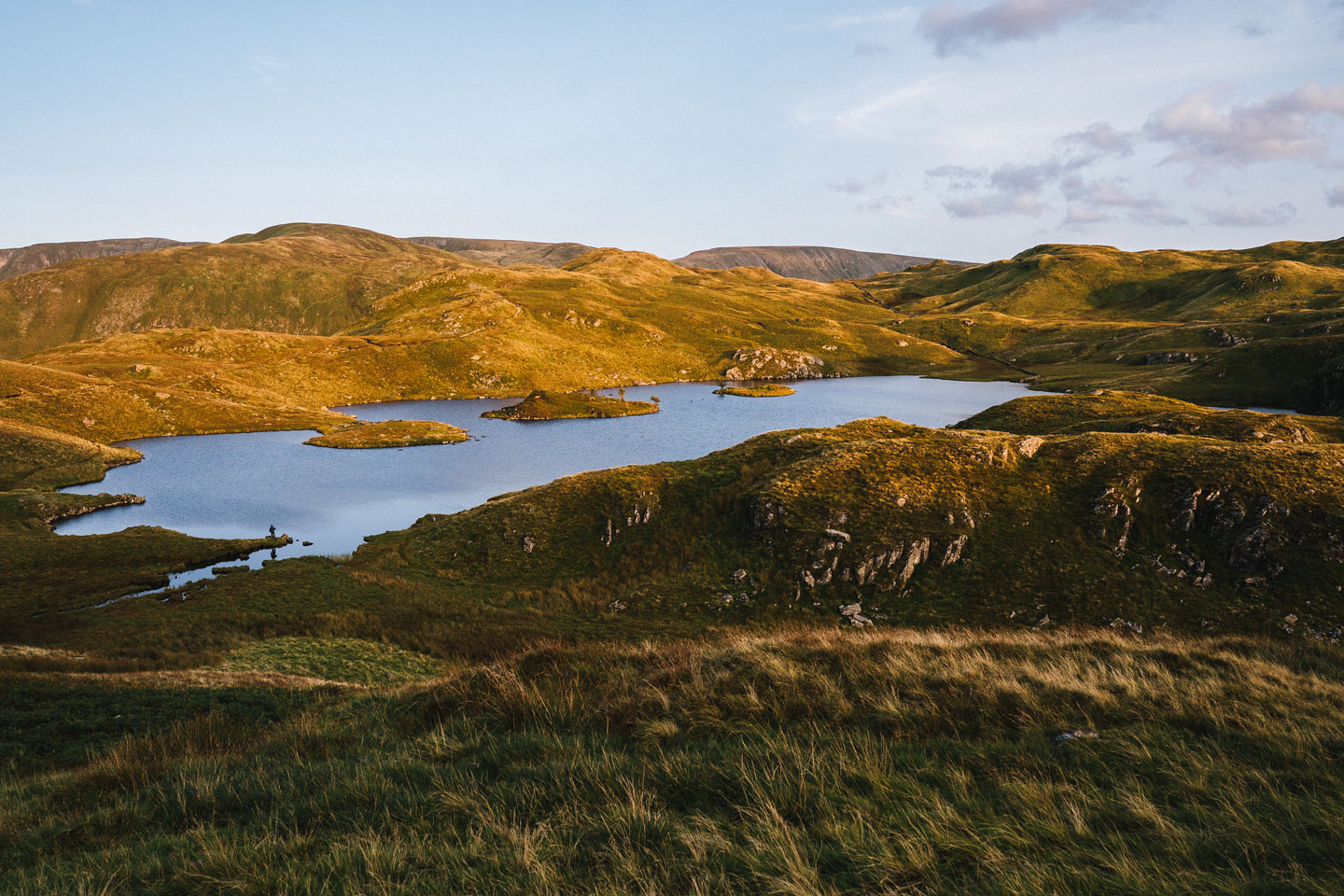
above A lake all to ourselves. After the close quarters of the Don and Sheaf, it was nice to stretch out and cast. While we struggled to find fish that first afternoon, it didn’t matter. The golds, pinks and reds of that evening’s sunset in this wild place were a treasure.Photo: Matthew DeLorme
We woke to the sound of an occasional rise on the water and peculiarly cold feet. Staggering out into the crisp morning air, we discovered the pole on the foot end of the tent had collapsed in the night, and rainfly condensation had soaked through to our sleeping bags. I fixed strong coffee and watched the water while trying to figure out which direction the fish were patrolling. The lake was a perfect mirror save for the interruption of the occasional rise.
This was the polar opposite of Sheffield. No evidence of the excesses of city life, just clean air and a lake full of elusive fish. There is something about waking up in the wild; your head gently clears and the world before you falls into place, exactly as it should be. You can be and fish, away from the confines of brick and cobble, without a need to fit into the constraints of urban life. The day seemed like it could wander off in any direction, and any direction would be just fine.
Duncan started casting down at the base of the peninsula, and I made a few casts near the point where the fish had risen most recently. No takers. I moved back from shore and higher up to scan the water, a large loop of line at my feet, and noticed a rise back to my right on the other side of the point. I ran over and hauled twice, landing the fly on the outer rings, concerned I may not have been quick enough when the brown came back. The water erupted and my line went tight. Minutes later, a lovely, dark trout lay in the net. For the rest of the morning, we followed the rises around the lake, missing only a couple of strikes, until the activity turned off. We packed up camp and headed to the outlet creeks for the rest of the day. Hiking up and out from the tarn, we passed the rolling hills, bare granite, gurgling creeks and seemingly endless skies of the Lake District. The scent of late-summer grass and heather was not only warm and comforting, but also a bittersweet reminder of shorter days around the corner. The tarns lingered in my thoughts, their dark surfaces reflecting the surrounding hills and bluebird skies, hiding secrets we sought to unlock.
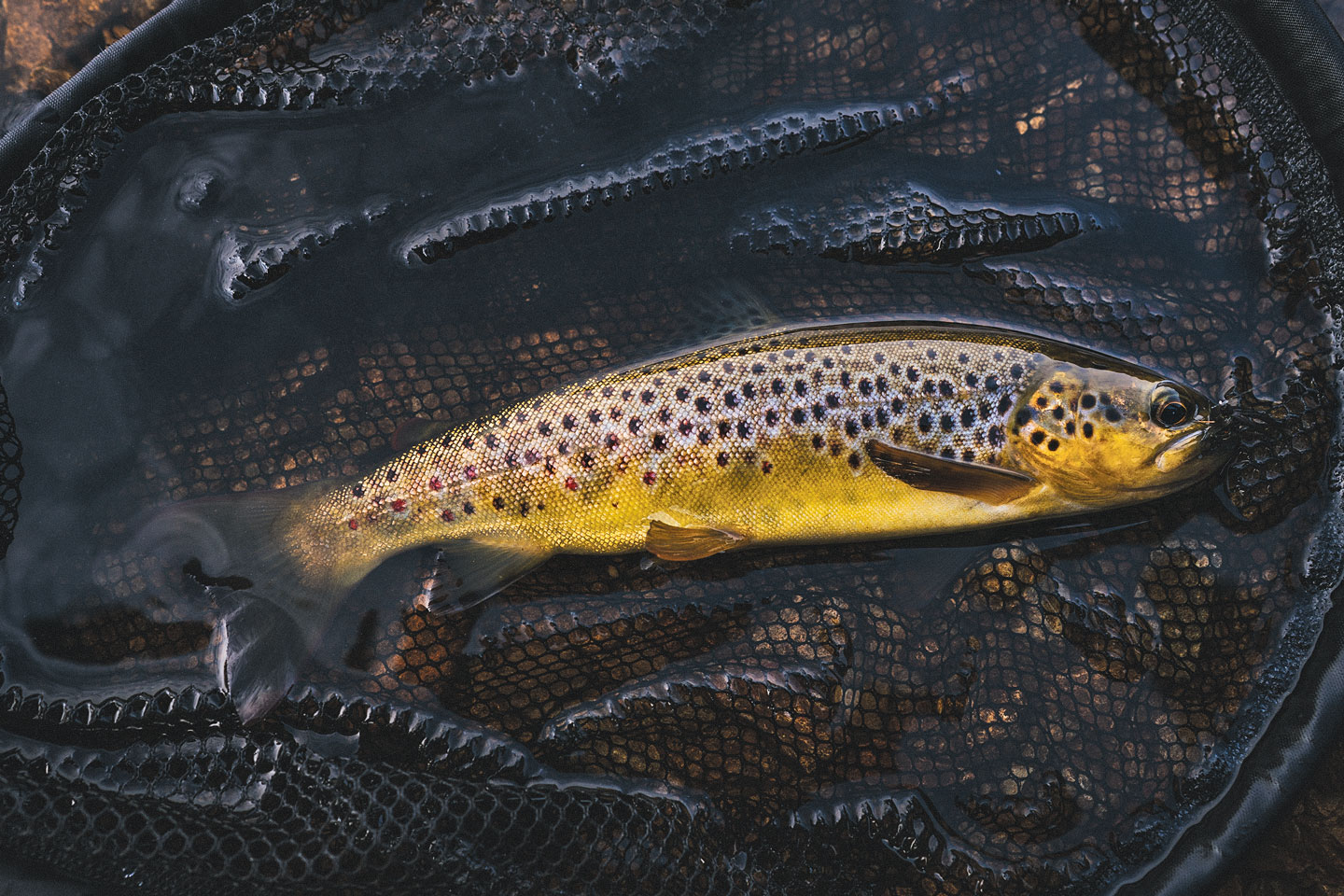
above One of nature’s finest color palettes on display, found in the depths of a Lake District tarn.Photo: Matthew DeLorme
It’s easy to understand why this place is so important to the people of England. The Brititsh use the Lake District as a sort of measuring stick for natural beauty when talking about wild places. There is the freedom to move, unrestricted, away from the stacked houses of city environs, smashed one on top of another. The ability to fish freely without the hefty price of a private water membership. This was everyone’s water and everyone’s land.
Back in the lower elevations, we found the outlet creek from a lower tarn and stealth-hiked down to the plunge pools. Crouched behind a boulder, Duncan made his first cast and no sooner did the fly touch the water in the back eddy of the pool, than a small trout came up like a torpedo from the depths. The little fish fought all the way to the net. We worked our way down the creek, fishing pool after pool with the same results: little brown trout smashing the fly. We laughed at the aggressiveness of every take. By late afternoon, fatigue had set in and we reluctantly began our descent, reliving stories from the day all the way back to the trailhead.
In Sheffield the next day, we made one last foray on the Sheaf. While we were no longer surrounded by the peace and quiet of the mountains, everything slowed down nonetheless as we watched for the subtle takes of grayling and the more aggressive browns. The hum of the city mingled with the bubble and gurgle of the river. In its way, it was nearly as peaceful as the Lake District, part of the fishing rhythm you fall into while the world around you carries on. There you are, in the river, casting, searching and fishing. And not much else matters.
Unlike Sheffield, where each bend in stream or roadway revealed more confirmation of human presence, each turn in the Lake District took us farther away.
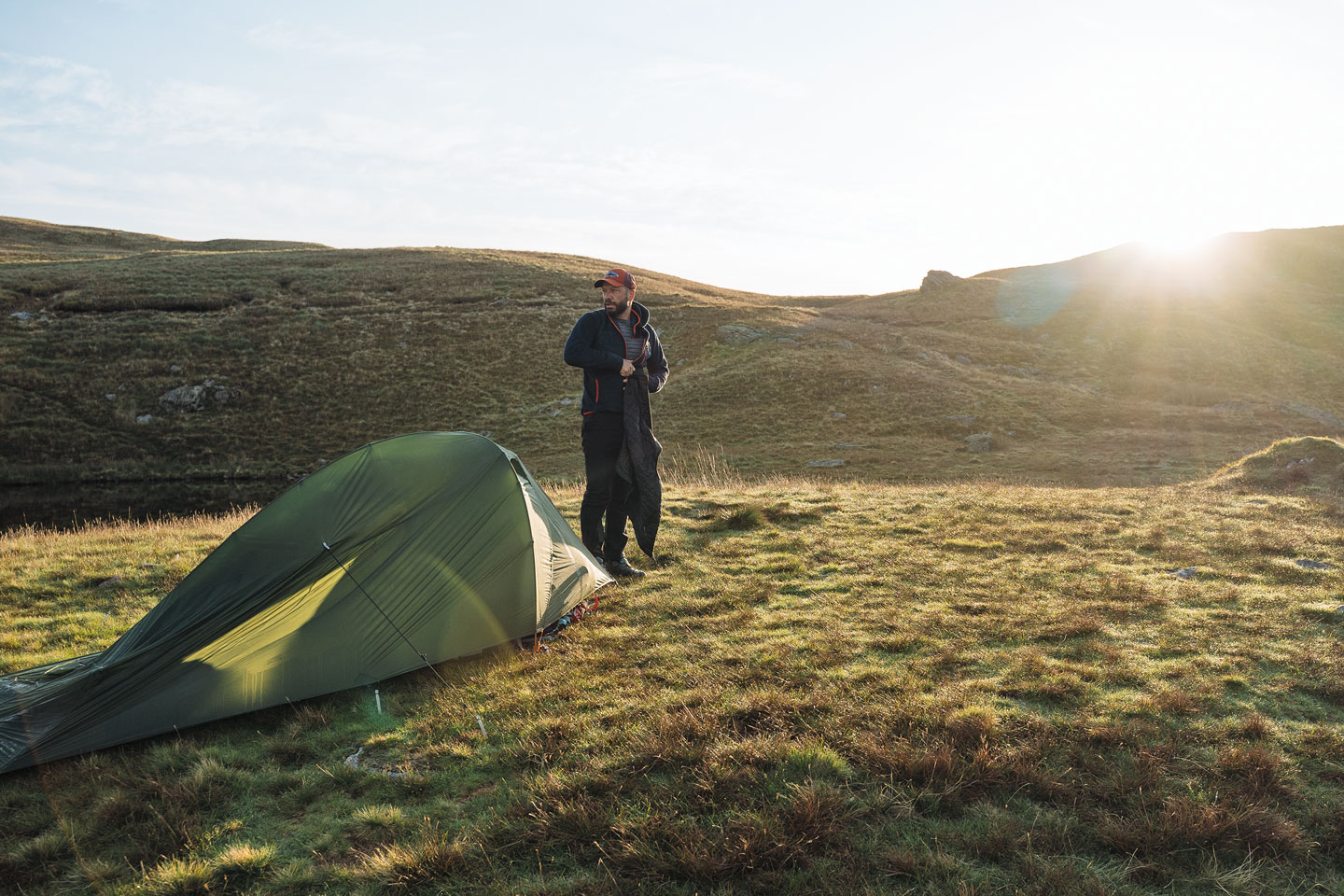
above After a surprisingly windy night, we woke to a fresh morning and a pleasant reminder of the remote location of the tarn. The water was still, interrupted only by infrequent rises out of casting reach.Photo: Duncan Philpott
This article first appeared in volume ten, issue three of The Flyfish Journal.
